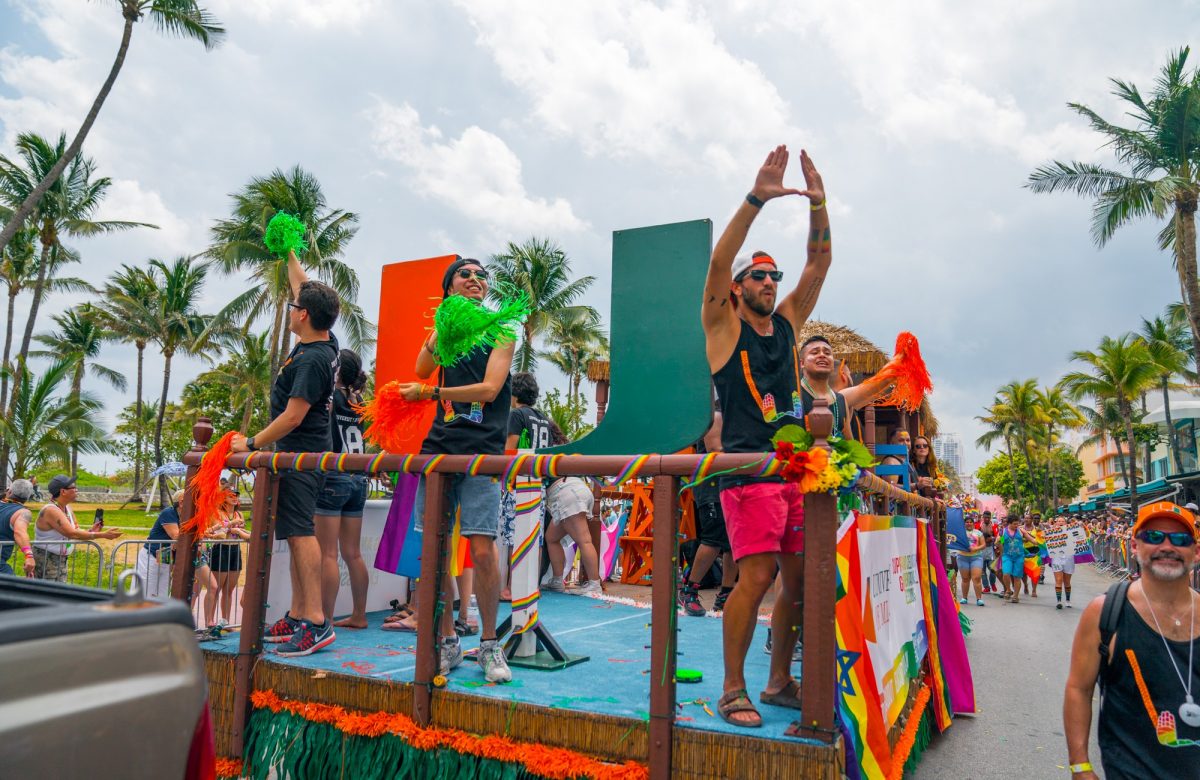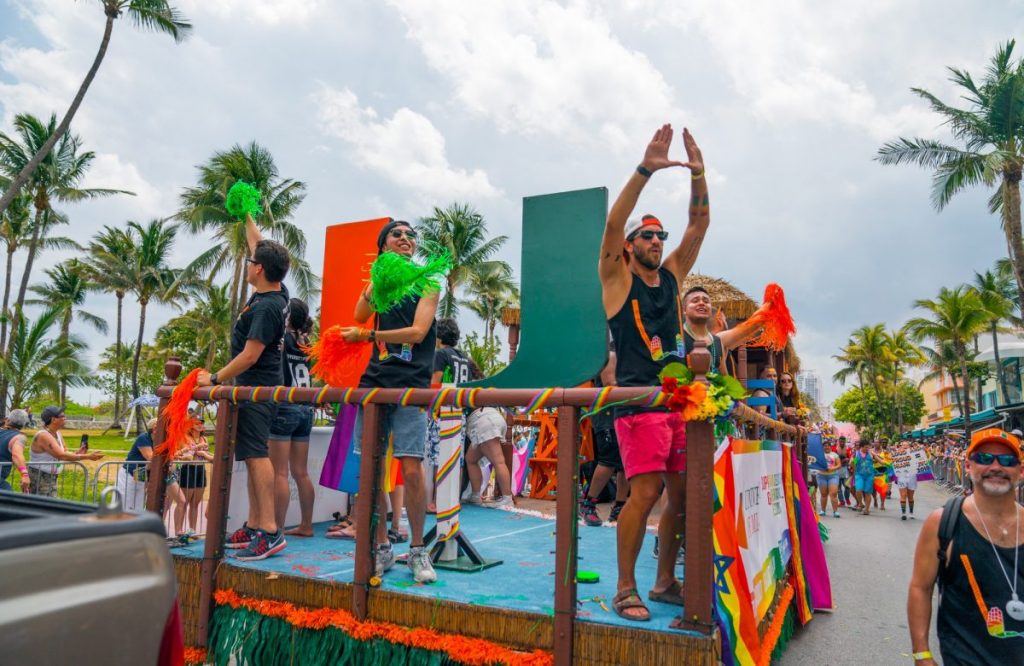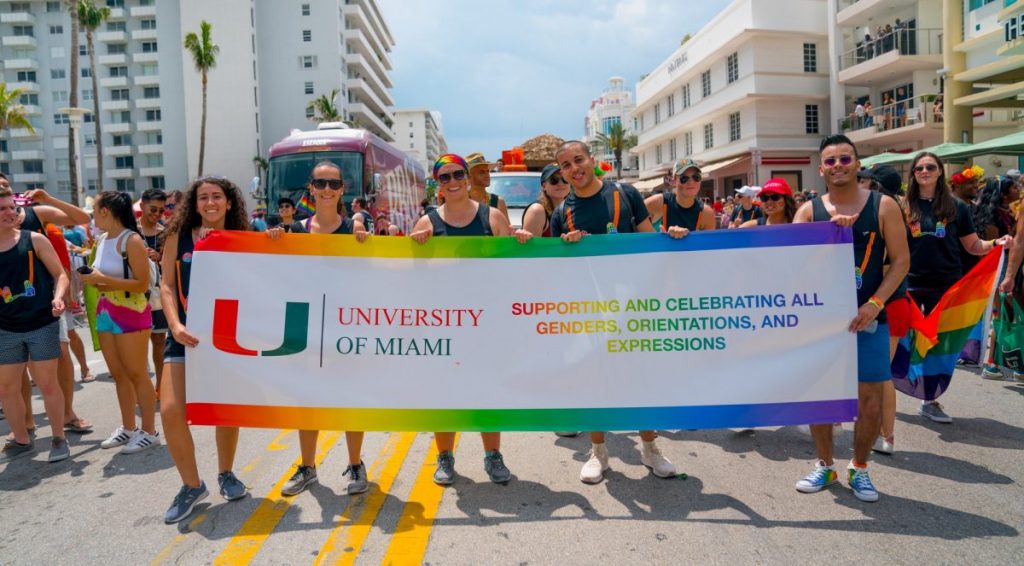

Hundreds of LGBTQ-identifying University of Miami alumni have graced the very walkways and buildings out-and-proud students do today. But one thing sets them apart – acceptance.
“The interesting thing is it wasn’t until the last five to seven years that the University of Miami really started embracing their LGBTQ population,” said Alice Kerr, a 1996 alumna who attended Miami Beach Pride 2018 with UM students over the weekend. “We used to come here, and you were lucky if you saw maybe 10 people be open enough to wear university apparel.”
Kerr and her wife both wore Turnover Chain T-shirts as they watched colorful floats parade down Ocean Drive.
More than 100 University of Miami students took to the streets of Miami Beach to celebrate their identities. SpectrUM, the University of Miami’s largest LGBTQ organization on campus, is also celebrating its 25th anniversary. Pushes for equality are bubbling up throughout the country. UM has a president who calls for a “culture of belonging” on campus. But it wasn’t always like this.
Kerr is a first-year student at UM’s Law School. Kerr also worked at the University of Miami for 23 years and obtained her master’s in 1996 from the university. She identifies as lesbian.
Though Kerr said it was only recently that the university started to push toward LGBTQ acceptance, it wasn’t necessarily the school that was lagging in the area of equality. Kerr said the community at large had an issue with anyone who identified as anything but heterosexual.
“South Beach is always known to have the ‘gay vibe,’ but once you got off of South Beach, it was kind of like everyone went back into the closet,” Kerr said. “Florida itself was not that accepting of people embracing themselves openly.”

Though Kerr said discrimination still exists, the momentum LGBTQ rights has right now is unlike what she saw as a student. She said she takes pride in seeing the number of students, including allies to the LGBTQ community, taking part in events across campus and in the community, such as at the pride parade.
Sheryl Borg, Kerr’s wife, graduated from her undergraduate program at UM in 1985 and obtained her master’s degree from UM in 1992. Borg retired in January 2018 after working for the university for 32 years. She has a lot of U pride and is even a member of the Iron Arrow Honor Society.
Borg said when she transferred to the university as an undergraduate, the campus was “quiet” and “very apathetic” toward anyone who seemed different.
“The students were not able to fully express themselves and, now, we come here under one umbrella,” Borg said. “I couldn’t be more proud of the community and how the community has evolved when I look out here onto what is happening on Ocean Drive. I am so proud to be part of that.”
Borg said she and Kerr attend events that support the new generation of LGBTQ students to offer their support and guidance on issues they’ve both gone through before, including navigating their experiences as lesbians.
“People come to their identity at different stages in life,” Kerr said. “If you’re not sure, it’s OK … but I firmly believe, number one, you have to be comfortable with yourself, and the more comfortable you get with your identity the more comfortable you get in the situations where you have to ‘out yourself.'”
Even now, legislation to protect LGBTQ community members has been slow. Florida isn’t one of the 18 states in the United States that protects LGBTQ people from being fired on the basis of gender identity or sexual orientation.
Kerr said one of the keys to being accepted is accepting yourself.
“Be patient with yourself,” Kerr said. “Be kind to yourself because there’s plenty of people in the world who won’t be … and gravitate around people that are also kind. Don’t be so hard on yourself. Do everything on your time.”






